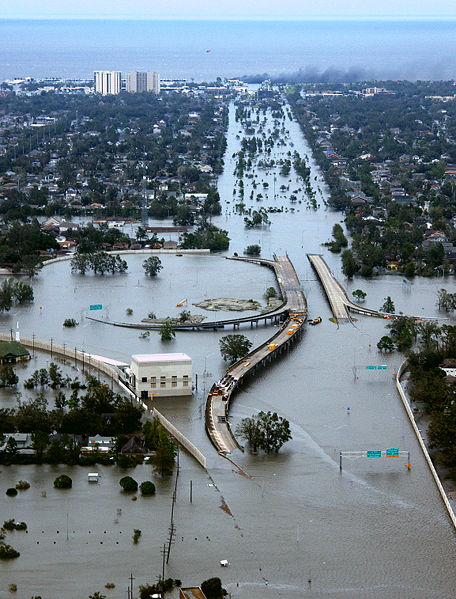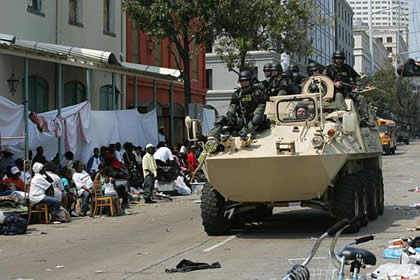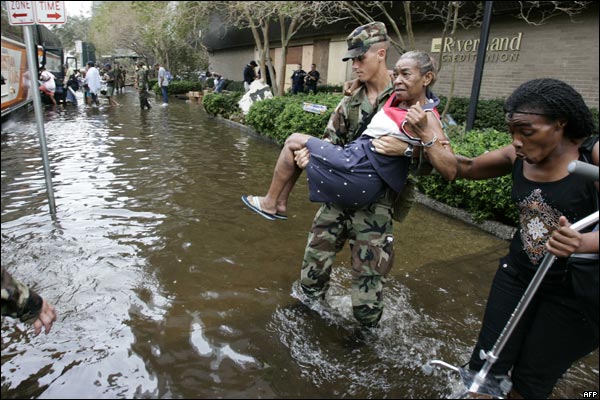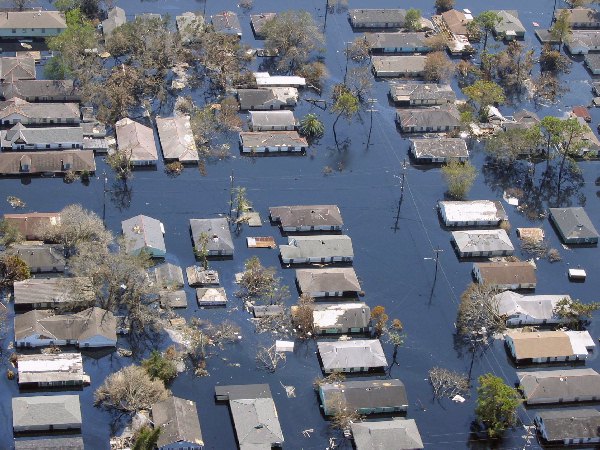|
New Orleans: Natural Disaster or Disaster Capitalism?
A City Torn Asunder:
Natural Disaster or Disaster Capitalism?

By Tiniel Parredon - 2008.
Prior to the onslaught of Hurricane Katrina or the chaos of evacuation, New Orleans' social infrastructure was failing. Due to economic and educational failure there incarceration rates and drop out rates were extremely high among young adults. This small urban community did not have a promising future in the area of academics.
In the end of August 2005, Hurricane Katrina was a disaster that caused many residing civilians to flee their homes, in a state of utter terror and apprehension. Efforts to rebuild infrastructure, pick up hurricane-related debris, and restore a level of normality to the residents of New Orleans, was quickly implemented but these were not the only strategic elements of government agencies in this time of displacement. There was a plan well established beyond the mere actions of reconstruction. Accident or not, The Shock Doctrine: The Rise of Disaster Capitalism reveals that there are no accidents in the world, as we know it. “Orchestrated raids on the public sphere in the wake of catastrophic events, combined with the treatments of disasters, as exciting market opportunities is essentially disaster capitalism.”(Klein, 2007) Disaster capitalism in New Orleans, Louisiana is deceptively called reconstruction.
The theory surrounding disaster capitalism is not a fairly new theoretical concept; it has been redefined and renamed. Friedman for over three decades reveals this tactic to his many followers. There are three main elements to disaster capitalism in regards to Friedman. Firstly, this line of attack is comprised of basically waiting for a major crisis. After the crisis has occurred in a town, city or country the government agencies controlling this area are able to sell off pieces of the state to private players. This occurs while citizens are still reeling from the incident that created a huge amount of shock. Lastly, but most importantly, this action must be accomplished rapidly and government powers make these reforms permanent. This is a technique that Friedman urges politicians to use when there country is under political, economic and social distress.

Ultimately, shock and awe are actions that create fears, dangers, and destruction that are incomprehensible to the people at large being affected, this allows for disaster capitalism. Government agencies were aware of the dangers in New Orleans before threatened with an extreme storm. This negligent behaviour lead to the over flooding of resident homes and institutions within this area.
In every American city it is evident that there is a two-tiered education system: one poor and one for the well off. The public school system located in New Orleans is one of the area's largest school districts. Unfortunately, it is widely recognized as the lowest performing school district in Louisiana. “According to researchers, only 12 of the 103 school districts in New Orleans showed reasonably good performance at the beginning of the twenty-first century.”(Hill, 2006) Therefore, it is evident that the public school system in place is failing children in the area of achieving high academic levels. The apparent low quality of public schools in New Orleans has encouraged and ultimately forced middle class families to educate their children in private or parochial institutions.
Consequently, middle class families are donating to these specific schools, which have contributed to major under funding in the area of the public school system. This limited funding has caused the public education system and its quality of service to be less fulfilling. It is evident that the climate for children was not conducive in relation to there learning experience. The school system due to the fact that it is under funded lacks resources that are essential to a positive learning environment for students. These schools were not advanced in the area of computer technology, lacked the proper amount of books needed to teach the amount of students enrolled within the educational facilities. The flood of this impoverished city has left “ fewer than 20 of approximately 120 school buildings remained usable.
The storm also largely destroyed the state and local tax bases from which the school district draws its revenues.”(Hill, 2006) All students and teachers were forced to evacuate, leaving everything essential to the learning experience behind, in order to save their own lives. The New Orleans parochial school system, which “educated 40 percent of New Orleans' students, was also devastated.”(Hill, 2006) Due to the lack of repair in this area of the flood walls and levees most of New Orleans' public education system was destroyed.

According to Naomi Klein, in this event government agencies within New Orleans lock in this large opportunity. The main change within the education system would be the types of schools and programs implemented. The administration under Bush’s command decided that this would be a perfect time to transform the educational system instead of rebuilding it. The President of The United States of America George W. Bush wanted to convert New Orleans existing schools into charter schools. Governor Kathleen Babineaux Blanco as she signed legislation in late November allowing the state of Louisiana to take over most of New Orleans' schools stated, "we see an opportunity to do something incredible."(Klein, 2007) Instead of viewing this natural disaster as a huge catastrophe, people whom except Friedman’s ideologies recognized it as a turning point for the educational system. This disaster ultimately led to the state take over of the district.
It is odd to see the rate at which the city was brought back to normality and the speed at which schools became replaced with privately run charter schools. In approximately nineteen months “with most of the poorest citizens in exile, New Orleans’ public school system had almost been completely replaced by privately run charter schools.”(Klein, 2007) Over these months the amount of public schools dwindled to an exceedingly low number of 4 in comparison to these newly transformed charter schools. Prior to Hurricane Katrina there were “7 charter schools” in the city and “now there is 31.”(Klein, 2007) This is a drastic change to the education system of any community. It is evident that the residents, who resided in this area prior to the storm, were against privatizing the public school system. The reason for this assumption is due to lack of financial resources.
These privately funded organizations require other funding agencies to sustain their maintenance. Would parents of children be able to afford these schools? Where was the community input in deciding this route? Well, this is how disaster capitalism works and is effective. There is no input from the community because in this time of complete shock the community as a whole body is broken, and therefore is not strong enough to fight against the implementation of privatization. In the state of Louisiana it is unmistakable that the members who resided there prior to the storm would not be able to afford the style of living that private agencies are proposing and therefore, the ultimate fate of these individuals would be that they would not return to there homes.


Education is a vital tool, which can improve the lifestyle of children and adults who are educated. Without proper schooling for children anywhere in the world, there prevails a lack of hope for tomorrow. The economic system does not understand this terminology or situation due to the fact that at the end of the equation there are no dollar signs. But what these government agencies fail to realize is that if young people are uneducated, it is impossible for the future of a nation or city to be great. Much of the dependency of the school system within New Orleans depends on how the economy develops. In New Orleans, after Hurricane Katrina the dismantling has already been done. The erasing of the public school system is just the beginning, of creating a system for economic purposes. It is evident that the decision of exploiting the New Orleans crisis is a clear advancement in the approach of a fundamentalist version of capitalism.
In the eyes of individuals “education could be one of the bright spots in New Orleans' recovery effort, which may even establish a new model for school districts nationally.”(Hill, 2006) For Naomi Klein and the theory surrounding disaster capitalism it is evidence that in the instance of this poor city, this was there main mission. Albert Einstein, one of the greatest scientists who ever lived once stated, “Out of difficulty, find opportunity.” In the case of New Orleans a wonderful opportunity resulted from an awful tragedy in the eyes of those who follow the theoretical framework stemming from disaster capitalism.
|